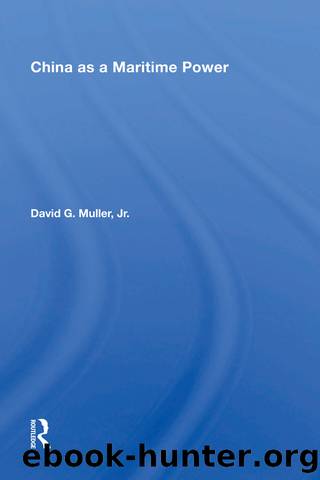China as a Maritime Power by David G. Muller

Author:David G. Muller [Muller, David G.]
Language: eng
Format: epub
Tags: History, China, Asia
ISBN: 9780865310988
Google: -0-CAAAAIAAJ
Goodreads: 15457885
Publisher: Westview Press
Published: 1983-12-04T00:00:00+00:00
The Influence of Lin Biao
It appears that the fortunes of Su Zhenhua, Xiao Jingguang, and Li Zuopeng during the Cultural Revolution can best be understood not in terms of their political philosophies and approaches to naval development, but rather in terms of their relationships to Lin Biao. From Lin's viewpoint, the navy in 1966 was an organization dangerously independent of his control Since 1960, it had both resisted and been excused from his program to politicize the PLA and make the armed forces responsive to his demands and policies. In early 1966, with China embarking upon what Lin must have foreseen as a period of intense turmoil, when the loyalty of the armed forces would be crucial, Lin could count on the personal loyalty of only one or two people in the highest echelons of the navy: Li Zuopeng and perhaps Wang Hongkun. But Li was only one of several deputy commanders; real power was held by Xiao Jingguang and Su Zhenhua. Li had to be promoted. As a career commanderârather than a political commissarâthe natural post for Li Zuopeng to move into would have been command of the navy. But Commander Xiao Jingguang was a lifelong personal friend of Mao Zedong's. Although probably not enthusiastic about the Cultural Revolution, Xiao was willing to go along with it, and thus he could not be purged. Su Zhenhua, on the other hand, was more vulnerable and was certainly more dangerous to Lin Biao's ambitions. So Li made the unusual shift from commandership to the political commissariat, displacing Su Zhenhua. Li did not restrict himself to the exercise of political authority, however. He made himself the de facto commander of the navy as well and stood ready to support Lin Biao in whatever way might be required.
As became evident once Li Zuopeng had taken effective power in the navy, the purgesâat least those at high levels, and probably most othersâwere politically sterile. While the accusations against those purged were redolent with radical political terminology, in fact the purges in the navy were aimed solely at securing its loyalty to Lin Biao. They were not intended to make the navy into a highly politicized, radical activist organization.
Download
This site does not store any files on its server. We only index and link to content provided by other sites. Please contact the content providers to delete copyright contents if any and email us, we'll remove relevant links or contents immediately.
| Africa | Americas |
| Arctic & Antarctica | Asia |
| Australia & Oceania | Europe |
| Middle East | Russia |
| United States | World |
| Ancient Civilizations | Military |
| Historical Study & Educational Resources |
Machine Learning at Scale with H2O by Gregory Keys | David Whiting(4313)
Never by Ken Follett(3956)
Fairy Tale by Stephen King(3396)
Oathbringer (The Stormlight Archive, Book 3) by Brandon Sanderson(3214)
The Man Who Died Twice by Richard Osman(3078)
Will by Will Smith(2919)
Rationality by Steven Pinker(2363)
Can't Hurt Me: Master Your Mind and Defy the Odds - Clean Edition by David Goggins(2341)
The Dark Hours by Michael Connelly(2307)
Friends, Lovers, and the Big Terrible Thing by Matthew Perry(2230)
The Dawn of Everything: A New History of Humanity by David Graeber & David Wengrow(2208)
Principles for Dealing With the Changing World Order: Why Nations Succeed and Fail by Ray Dalio(2054)
A Short History of War by Jeremy Black(1848)
HBR's 10 Must Reads 2022 by Harvard Business Review(1844)
Go Tell the Bees That I Am Gone by Diana Gabaldon(1758)
A Game of Thrones (The Illustrated Edition) by George R. R. Martin(1744)
Kingdom of Ash by Maas Sarah J(1677)
515945210 by Unknown(1666)
443319537 by Unknown(1559)
